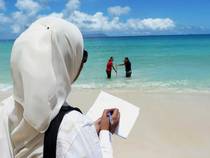
© UNESCO/ M. Clüsener-Godt
Island Biodiversity
This year, the International Day for Biological Diversity is dedicated to “island biodiversity,” in line with the designation by the United Nations General Assembly of 2014 as the International Year of Small Island Developing States.
In September, Samoa will host the Third International Conference of Small Island Developing States. UNESCO is helping to prepare this major event, which will help to shape a new global sustainable development agenda to follow 2015. This agenda must recognize the importance of Small Island Developing States for global sustainable development.
Unique biodiversity
Island biodiversity is essential here. Many islands and archipelagos have evolved unique biodiversity over time, with a high rate of endemism and particular conservation challenges, with species on small islands being particularly vulnerable to extinction.
The livelihoods and cultural identities of islanders have always been inextricably linked to biodiversity. However, with the presence of people and associated biodiversity — crops, livestock and pests — the risk of extinction to native biodiversity is especially high, and novel communities of species have largely replaced native island biodiversity in many places. Today, climate change, natural disasters, and skewed development are threatening the sustainability of human communities on islands as well as island biodiversity.
Taking action
UNESCO is acting to address these challenges. The sub Network of Island and Coastal Biosphere Reserves (20 members) and the Network for Pacific Biosphere Reserves (10 members) belong to the World Network of Biosphere Reserves under UNESCO’s Man and the Biosphere Programme. The World Heritage Convention also includes many natural sites on islands.
UNESCO’s Intergovernmental Oceanographic Commission is building the leadership capacity of the directors of marine and coastal sciences institutes, with a focus on Small Island Developing States, where livelihoods depend heavily on marine resources.
The Intergovernmental Oceanographic Commission’s Ocean Biogeographic Information System is a gateway to the world's ocean biodiversity and biogeographic data and information, building and maintaining a global alliance of over 500 institutions in 56 countries, including in Small Island Developing States.
UNESCO is also working through such initiatives as Climate Frontlines and Sandwatch, to build the capacities of islanders and to develop networks that help communities to self-organise and create their own resources that are culturally sensitive and scientifically sound. This includes initiatives to help conserve island biodiversity.
Throughout all of this, UNESCO is committed to working with all partners for the implementation of the Programme of Action for the Sustainable Development of Small Island Developing States, and the Organization is contributing full-steam to preparing a successful Third International Conference of Small Island Developing States.
As we shape the post-2015 development agenda, we must recognise the importance of island biodiversity and work together to ensure the conservation of this precious and irreplaceable natural resource, which is the basis of human well-being.
Message from Ms Irina Bokova, Director-General of UNESCO,
on the occasion of the International Day for Biological Diversity 2014
English ǀ Français ǀ Español ǀ Русский ǀ العربية ǀ 中文 (pdf)
UNESCO IN ACTION
- UNESCO Biodiversity Initiative
- UNESCO & SIDS
- IOC-UNESCO's Ocean Biogeographic Information System
- Sandwatch
- Climate Frontlines
A global forum for indigenous peoples, small islands and vulnerable communities
UNESCO Sites
Resources
- Islands of the Future – Building resilience in a changing world (pdf)
- Reef and Rainforest: An Environmental Encyclopedia of Marovo Lagoon, Solomon Islands
- Women’s Knowledge: Traditional Medicine and Nature (Mauritius, Reunion and Rodrigues)
- Biosphere Reserves as Tools for Socio-economic Development in the Caribbean Small Islands States
Biodiversity Goals
Sustainable development must take both biological and cultural diversity into account
It is recognized that linguistic diversity roughly parallels biodiversity. Loss of biodiversity hollows out the foundations of local cultures thus altering their subsequent development and their sense of belonging to a specific place.
Many indigenous and local communities shape and manage biodiversity through their actions and social organization. Land tenure and stewardship systems, combined with knowledge and knowhow, have a very important role in conserving natural ecosystems.








